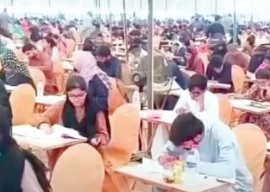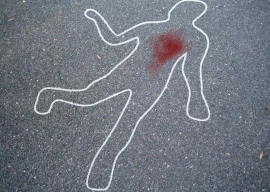
In the university itself, classes were cancelled by activists of political parties. The university’s administration employees protested outside the administration block as the seminar proceeded in the Arts Auditorium against the hegemony of student activists at the campus.
The project — was inspired by the London project of History and Policy by King’s College London. History Media Policy (HMP) — aims to bring the academia, media and policy makers together in light of accurate historical data. It will try and channelise various academic researches to the knowledge of the policy makers. The history department also took advantage if this opportunity to launch their biannual research journal, called Journal of History and Social Sciences.
In their presentation, Arwa Juzar and Adeel Ahmed Khan referred to the Haldane Report of 1918, according to which the research spending of the government should be decided by researchers themselves instead of the politicians and should be supervised by independent research councils.
One of the speakers was the additional deputy commissioner Karachi South, Afzal Zaidi. He is also a former student and teacher at the history department. He deplored that election turn out was very low in Pakistan. “With only 18 per cent of the people deciding who comes to power how can you expect the government to form a tangible policy?” said Zaidi. He graduated in 2001 and then taught in the department for more than four years. “At home we are told to stay away from politics. The university also makes you promise to do the same before the admission,” he said, referring to an affidavit all the students have to sign at the time of their admission to pledge that they will not take part in any political activity. “But then how can you bring a change if you are supposed to do nothing? A citizen only becomes equal by the power of his vote. All of us have only one vote to give.”
Referring to the earlier presentation, Zaidi said it was the feudal mindset that had to be abolished instead of the feudal land practice itself. “Even in capitalist countries like America you are free to own as much land as you like,” he said. “But you have to treat a human being as a human being which lacks in our industrialists and feudal.”
Prof. Nisar Zuberi from the mass communication department said that the policy makers had the tendency to decide matters without actually understanding the root of the problem. While replying to Zaidi’s comments about being more politically active, Prof Zuberi, who has remained the editor of Akhbar-e-Jahan for about two decades, pointed out that even if the urban population were politically active, the deciding vote comes from the large chuck of rural population of the country. “So while you create political awareness among the students it is also imperative to convince the haaris not to vote for their feudal lord.”
Shamimur Rahman, a senior correspondent at Dawn, justified the criticism on media ethics by almost all the speakers. He said that media was a reflection of the society, not a hub for producing information or theories. “If people are uneducated then it will reflect in the media,” he replied to those who talked about the crass behaviour of television anchors and politicians in talks shows. “This is the outcome of not nurturing our nurseries of producing thoughtful individuals which are primary and secondary education.” But he also admitted that sometimes the media people did not confirm their facts before reporting it. “This is why we need the academia, to provide us with information and verify it for us,” he said. “A policy maker will never reveal that information.”
Published in The Express Tribune, April 27th, 2012.
COMMENTS (1)
Comments are moderated and generally will be posted if they are on-topic and not abusive.
For more information, please see our Comments FAQ
1730959638-0/trump-(19)1730959638-0-405x300.webp)
1719925273-0/BeFunky-collage-(46)1719925273-0-165x106.webp)















Love the coverage Tehmina, its the first article to mention us students contribution and we are very glad you did so since the whole focus was to bring students into the limelight...Others have focused on the guest speakers more and thanks for such a positive view!